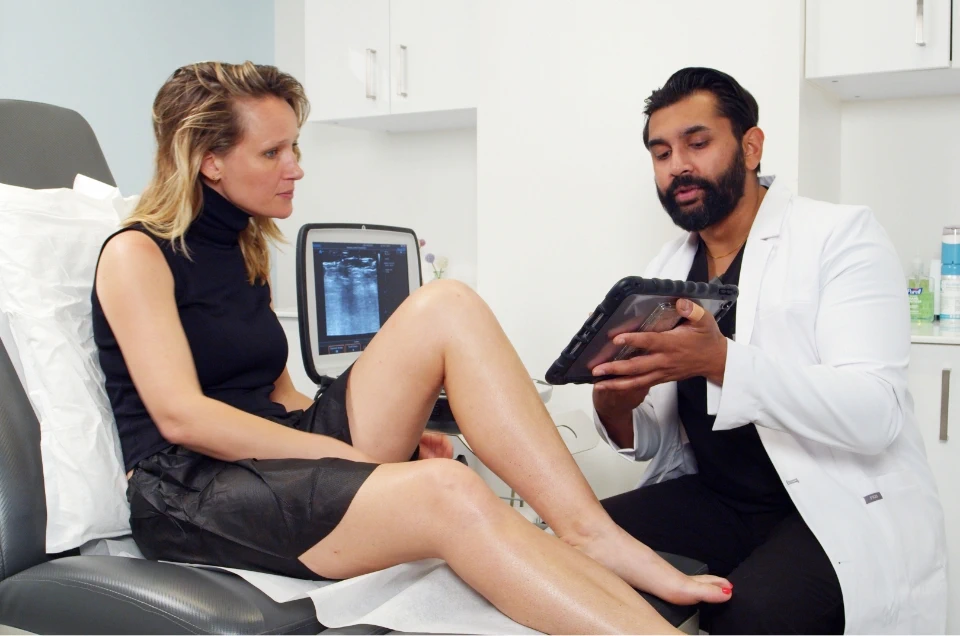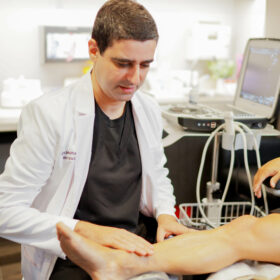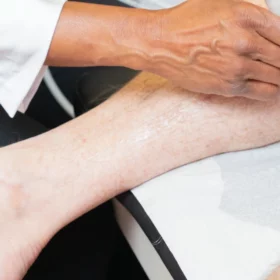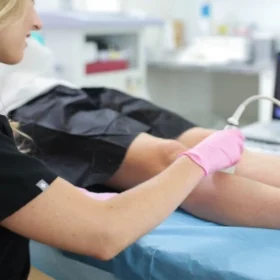At Vein Treatment Clinic, we understand the significance of diet and nutrition in maintaining optimal leg vein health. Our board-certified vein doctors are committed to providing comprehensive care that encompasses lifestyle factors, including dietary choices. In this article, we explore the benefits of adopting a balanced diet rich in nutrients that promote vein health.
1. Reduction of Inflammation
Inflammation plays a significant role in the development of venous disorders such as varicose veins and chronic venous insufficiency (CVI). Consuming a diet high in anti-inflammatory foods can help mitigate inflammation and its adverse effects on vein health.
Incorporating foods rich in omega-3 fatty acids, such as fatty fish (salmon, mackerel, and sardines), flaxseeds, and walnuts, can help reduce inflammation throughout the body, including the veins in your legs. Additionally, fruits and vegetables, particularly those with vibrant colors like berries, spinach, and kale, are packed with antioxidants that combat inflammation and support overall vascular health.
2. Maintenance of Healthy Blood Pressure
High blood pressure can exert excessive force on the walls of the veins, leading to weakened vein valves and impaired circulation. A diet low in sodium and rich in potassium, magnesium, and calcium can help regulate blood pressure and promote healthy venous blood flow.
Potassium-rich foods such as bananas, sweet potatoes, and avocados aid in vasodilation, reducing the strain on the veins and improving circulation. Incorporating magnesium-rich foods like almonds, spinach, and black beans can further support vascular health by relaxing blood vessels and reducing blood pressure. Additionally, calcium-rich foods such as dairy products, tofu, and leafy greens contribute to strong vein walls, preventing the development of varicose veins and venous insufficiency.
3. Strengthening of Vein Walls
Weak vein walls are more susceptible to dilation and the formation of varicose veins. Consuming a diet abundant in nutrients that support collagen synthesis and connective tissue strength can help fortify vein walls and enhance their resilience.
Vitamin C, found in citrus fruits, strawberries, and bell peppers, is essential for collagen production and can aid in maintaining the structural integrity of veins. Similarly, foods rich in flavonoids, such as citrus fruits, onions, and dark chocolate, promote collagen synthesis and improve vein elasticity. Furthermore, incorporating protein sources like lean meats, poultry, fish, and legumes provides amino acids necessary for collagen formation and tissue repair, contributing to stronger and healthier vein walls.
4. Promotion of Optimal Blood Circulation
Healthy blood circulation is crucial for preventing venous disorders and promoting overall vascular wellness. Certain nutrients play a key role in supporting circulation and preventing blood clots that can impede venous flow.
Omega-3 fatty acids found in fish oil and flaxseed oil help maintain blood fluidity and reduce the risk of clot formation. Additionally, consuming foods rich in vitamin E, such as nuts, seeds, and vegetable oils, supports circulation by preventing blood platelets from clumping together and forming clots. Moreover, garlic, known for its anticoagulant properties, can promote smooth blood flow through the veins.
5. Reduction of Venous Pressure
Excessive pressure within the veins can contribute to the development and progression of venous disorders. Dietary modifications aimed at reducing venous pressure can alleviate symptoms and improve vein health.
Fiber-rich foods such as whole grains, legumes, fruits, and vegetables aid in digestion and promote regular bowel movements, preventing constipation and reducing intra-abdominal pressure. Maintaining a healthy weight through a balanced diet and regular physical activity can also alleviate pressure on the veins and reduce the risk of venous insufficiency. Additionally, staying hydrated by drinking plenty of water supports healthy blood volume.
Dietary Tips to Improve Leg Vein Health
Maintaining optimal leg vein health involves more than just knowing which foods to eat; it also requires making mindful dietary choices that support vascular wellness. Here are some dietary tips to help improve leg vein health:
1. Embrace a Plant-Based Diet
Plant-based diets, rich in fruits, vegetables, whole grains, nuts, and seeds, offer numerous benefits for leg vein health. These foods are packed with essential nutrients, antioxidants, and fiber, which promote circulation, reduce inflammation, and support overall vascular health. Aim to fill your plate with a variety of colorful fruits and vegetables, incorporating leafy greens, berries, citrus fruits, and cruciferous vegetables like broccoli and Brussels sprouts.
2. Limit Sodium Intake
Excessive sodium consumption can contribute to water retention and increase blood pressure, placing added stress on the veins. To reduce the risk of swelling and inflammation, limit your intake of processed and high-sodium foods, such as canned soups, processed meats, salty snacks, and fast food. Instead, opt for fresh, whole foods seasoned with herbs, spices, and lemon juice to enhance flavor without relying on salt.
3. Stay Hydrated
Proper hydration is essential for maintaining healthy blood volume and supporting optimal circulation. Aim to drink plenty of water throughout the day, especially in warm weather or during periods of physical activity. Hydration helps prevent blood from thickening and clotting, reducing the risk of venous issues. Limiting the consumption of sugary beverages and caffeinated drinks can also support hydration and vein health.
4. Incorporate Healthy Fats
Healthy fats, such as those found in fatty fish, avocados, olive oil, nuts, and seeds, play a crucial role in promoting cardiovascular health and reducing inflammation. Omega-3 fatty acids, in particular, have anti-inflammatory properties that can benefit leg vein health by reducing swelling and improving circulation. Include sources of healthy fats in your diet to support vein function and maintain overall vascular wellness.
5. Opt for Lean Protein Sources
Protein is essential for tissue repair and muscle maintenance, both of which are important for vein health and circulation. Choose lean protein sources such as poultry, fish, tofu, legumes, and low-fat dairy products to minimize saturated fat intake and promote cardiovascular health. Incorporating protein-rich foods into your meals and snacks can help stabilize blood sugar levels and prevent cravings for unhealthy snacks high in refined carbohydrates and sugars.
6. Mind Your Portions
Overeating can lead to weight gain and increase the risk of venous issues such as varicose veins. Practice portion control by listening to your body’s hunger and fullness cues and avoiding oversized servings. Opt for smaller, more frequent meals and snacks to prevent overeating and promote steady energy levels throughout the day. Pay attention to portion sizes when dining out or preparing meals at home to maintain a healthy weight and support vein health.
Incorporating these dietary tips into your daily routine can help improve leg vein health and support overall vascular wellness. By making informed choices about the foods you eat and prioritizing nutrient-rich options, you can take proactive steps toward preserving the health and vitality of your veins for years to come.
Contact VTC to Improve Vein Health
Incorporating a nutrient-rich diet into your lifestyle can have profound benefits for your leg vein health. By reducing inflammation, maintaining healthy blood pressure, strengthening vein walls, promoting optimal circulation, and alleviating venous pressure, you can support the overall health and function of your veins. At Vein Treatment Clinic, we emphasize the importance of holistic approaches to vein care, including dietary interventions tailored to individual needs.
However, it’s important to emphasize that dietary changes can’t treat existing vein problems. If you have spider veins, varicose veins, or underlying venous insufficiency, you need minimally invasive vein treatments that can address the root cause of your problems. Our board-certified vein doctors offer the latest treatments to treat vein disease and help you maintain optimal vein health. Please schedule a consultation to maintain optimal vein health.











